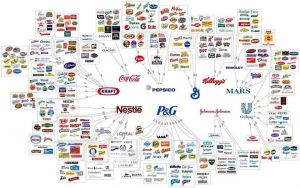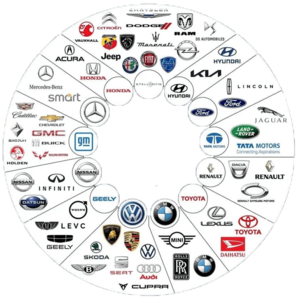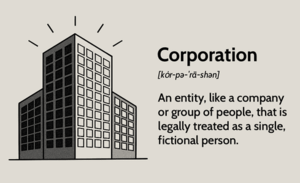Corporation: Difference between revisions
m (→Behaviour) |
mNo edit summary |
||
| (17 intermediate revisions by the same user not shown) | |||
| Line 1: | Line 1: | ||
[[File:Corporation definition.png|alt=Corporation definition|thumb|'''Figure 1'''. Corporations are legally people!<ref name=":0" /> | [[File:Corporation definition.png|alt=Corporation definition|thumb|'''Figure 1'''. Corporations are legally people!<ref name=":0" /><ref name=":1">'''Santa Clara County v. Southern Pacific''', U.S. Supreme Court (1886): 118 U.S. 394. Decided: May 9, 1886. Accessed 6<sup>th</sup> Jan 2022 via https://supreme.justia.com/cases/federal/us/118/394/</ref>]] | ||
'''A traditional corporation, although comprised of individual parts such as directors, officers, and shareholders is legally recognized as a single "''natural person''".''' As such it is entitled the same protection as any other human protected by the US Bill of Rights<ref name=":1" /> except one key difference, you cannot put a corporation into jail. | |||
==Behaviour== | ==Behaviour== | ||
[[File:Corporate ownership.jpg|alt=Corporate ownership|thumb|'''Figure 2'''. Corporate [[oligopolies]] | [[File:Corporate ownership.jpg|alt=Corporate ownership|thumb|'''Figure 2'''. Corporate [[oligopolies]] feed us.]]The prime driver of corporate entities is self-survival, the second, is their [[Fiduciary Duty|fiduciary duty]] to pursue revenue for the financial gain of employees and shareholders. These paramount, binding principles give corporations a [[Machines|machine]] like quality which if it was a ''natural'' person<ref name=":1" /> would meet the diagnostic criteria for [[psychopath|psychopathy]]<ref name=":0">'''The Corporation: The Pathological Pursuit of Profit and Power'''. Bakan, Joel, New York: Free Press, 2004. [https://thecorporation.com/film/book https://thecorporation.com/]</ref>. These general traits of corporations are compounded by the fact that people with narcissistic traits tend to get promoted 39% faster in their progression to CEO<ref>'''The perks of narcissism: Behaving like a star speeds up career advancement to the CEO position'''. The Leadership Quarterly: Published June 2021, Accessed 28th September 2022 via https://doi.org/10.1016/j.leaqua.2020.101489</ref> resulting in at least three times as many psychopaths in executive or CEO roles than in the overall population<ref>'''Corporate Psychopathy: Talking the Walk'''. Paul Babiak, Ph.D.y, Craig S. Neumann, Ph.D.z and Robert D. Hare, Ph.D. Behavioral Sciences and the Law. Behav. Sci. Law 28: 174–193 (2010). Published online 6 April 2010 in Wiley InterScience DOI: 10.1002/bsl.925. Accessed on 28 September 2022 via https://www.sakkyndig.com/psykologi/artvit/babiak2010.pdf</ref>. | ||
=== ''Why is that so bad? They get the job done after all!'' === | |||
Psychopathic behaviour is bad, for everyone, as they only amount to 1% of the adult population but are reported to be responsible for about 50% of all serious crimes and constitute 20% of (North American) prison populations<ref>'''''Without conscience: The disturbing word of the psychopaths among us''.''' Hare, R. (1999). New York: Guildford Press. https://www.google.com/books/edition/_/xfIEVtzj52YC?hl=en</ref>. This will only get worse with the emergence of of A.I. as power will further centralise into the few who hold these traits.[[File:Corporate owners-media.png|alt=Corporates oligopolies own our media.|thumb|'''Figure 3.''' Corporates [[oligopolies]] write our media.]] | |||
=== Solutions === | |||
==== ''Past solutions?'' ==== | |||
[[File:Car manifacture oligopoly2.png|alt=Car manufacture oligopoly2|thumb|'''Figure 4'''. Corporate [[oligopolies]] make our cars.]] | |||
Numerous startups are launched on the premise of challenging and transforming the existing norms and conventions. Yet, the reality of funding poses a challenge: a significant number of these new companies rely on venture capital investments, which are inherently driven by the pursuit of profit. This financial dependency can make it difficult for a company to prioritize anything over profit-making. Even in cases where ethical considerations are explicitly valued, such as Google's initial "''Don't Be Evil''" motto—which was notably dropped from its code of conduct in 2022<ref>'''Google quietly removes ‘don’t be evil’ preface from code of conduct'''. The Independent Newspaper UK - Anthony Cuthbertson, published on Monday 21 May 2018. Accessed on 29th Sept 2022 via: https://www.independent.co.uk/tech/google-dont-be-evil-code-conduct-removed-alphabet-a8361276.html</ref>—commercial interests often end up taking precedence over ethical ones. | |||
==== Proposed solutions. ==== | |||
To resolve these issues, we need to step away from the traditional corporate structure and start again. One suggested solution is that an organisation is created which enacts [[Tenet|Tenets]] in a [[ROM|read only]] format from its inception and enforce their adoption with [[transparency]]. This is the basis of [[The Transparent Company]]... | |||
====References==== | ====References==== | ||
<references /> | <references /> | ||
Latest revision as of 09:00, 29 January 2024
A traditional corporation, although comprised of individual parts such as directors, officers, and shareholders is legally recognized as a single "natural person". As such it is entitled the same protection as any other human protected by the US Bill of Rights[2] except one key difference, you cannot put a corporation into jail.
Behaviour

The prime driver of corporate entities is self-survival, the second, is their fiduciary duty to pursue revenue for the financial gain of employees and shareholders. These paramount, binding principles give corporations a machine like quality which if it was a natural person[2] would meet the diagnostic criteria for psychopathy[1]. These general traits of corporations are compounded by the fact that people with narcissistic traits tend to get promoted 39% faster in their progression to CEO[3] resulting in at least three times as many psychopaths in executive or CEO roles than in the overall population[4].
Why is that so bad? They get the job done after all!
Psychopathic behaviour is bad, for everyone, as they only amount to 1% of the adult population but are reported to be responsible for about 50% of all serious crimes and constitute 20% of (North American) prison populations[5]. This will only get worse with the emergence of of A.I. as power will further centralise into the few who hold these traits.

Solutions
Past solutions?

Numerous startups are launched on the premise of challenging and transforming the existing norms and conventions. Yet, the reality of funding poses a challenge: a significant number of these new companies rely on venture capital investments, which are inherently driven by the pursuit of profit. This financial dependency can make it difficult for a company to prioritize anything over profit-making. Even in cases where ethical considerations are explicitly valued, such as Google's initial "Don't Be Evil" motto—which was notably dropped from its code of conduct in 2022[6]—commercial interests often end up taking precedence over ethical ones.
Proposed solutions.
To resolve these issues, we need to step away from the traditional corporate structure and start again. One suggested solution is that an organisation is created which enacts Tenets in a read only format from its inception and enforce their adoption with transparency. This is the basis of The Transparent Company...
References
- ↑ 1.0 1.1 The Corporation: The Pathological Pursuit of Profit and Power. Bakan, Joel, New York: Free Press, 2004. https://thecorporation.com/
- ↑ 2.0 2.1 2.2 Santa Clara County v. Southern Pacific, U.S. Supreme Court (1886): 118 U.S. 394. Decided: May 9, 1886. Accessed 6th Jan 2022 via https://supreme.justia.com/cases/federal/us/118/394/
- ↑ The perks of narcissism: Behaving like a star speeds up career advancement to the CEO position. The Leadership Quarterly: Published June 2021, Accessed 28th September 2022 via https://doi.org/10.1016/j.leaqua.2020.101489
- ↑ Corporate Psychopathy: Talking the Walk. Paul Babiak, Ph.D.y, Craig S. Neumann, Ph.D.z and Robert D. Hare, Ph.D. Behavioral Sciences and the Law. Behav. Sci. Law 28: 174–193 (2010). Published online 6 April 2010 in Wiley InterScience DOI: 10.1002/bsl.925. Accessed on 28 September 2022 via https://www.sakkyndig.com/psykologi/artvit/babiak2010.pdf
- ↑ Without conscience: The disturbing word of the psychopaths among us. Hare, R. (1999). New York: Guildford Press. https://www.google.com/books/edition/_/xfIEVtzj52YC?hl=en
- ↑ Google quietly removes ‘don’t be evil’ preface from code of conduct. The Independent Newspaper UK - Anthony Cuthbertson, published on Monday 21 May 2018. Accessed on 29th Sept 2022 via: https://www.independent.co.uk/tech/google-dont-be-evil-code-conduct-removed-alphabet-a8361276.html
